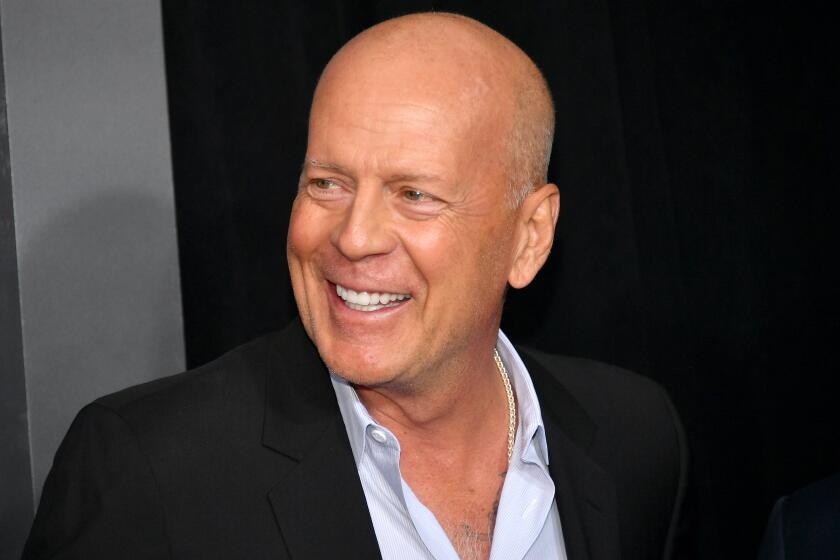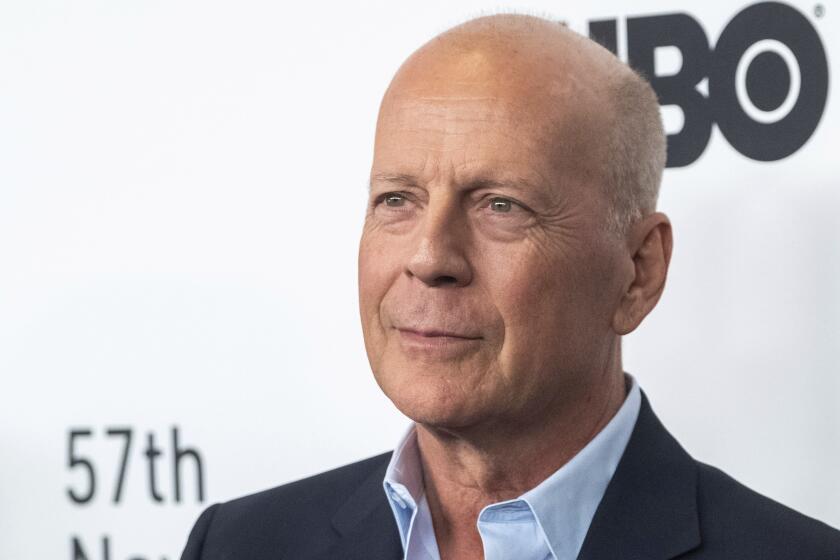Bruce Willis’ family opened up about his health. Their heroic act will help others

- Share via
Charles DeCarli, director of the UC Davis Alzheimer’s Disease Center, was distraught when he heard that Bruce Willis had been diagnosed with a brain disease a few weeks ago — partly because he knows better than most what it means.
The news took him back to the time in Washington, D.C., when he saw the film star perform with his band.
DeCarli said Willis “plays a pretty wicked harmonica” and “wasn’t a totally bad singer.”
Even dedicated Willis fans may not know that in 1987, he dropped an album, “The Return of Bruno.” Soon after, his version of “Respect Yourself” hit No. 5 on the Billboard charts, and led to a perfectly ’80s video with Willis singing into the handle of a broom while June Pointer of the Pointer Sisters shimmied along.
So when the doctor heard about Willis’ diagnosis of aphasia and his decision to step away from acting, it was that creativity, the joy he saw in Willis as he performed live, that DeCarli began to mourn.
But like me, DeCarli was also thinking of Willis’ family, and their admission to a club nobody wants to join.
My father has dementia. If I had to guess, I’d say he’s about a quarter of a way through a process that sometimes robs him of his ability to remember my name, or basic details about his life. But he still has a driver’s license and a resolute stubbornness that nothing is wrong.
And that’s how it goes when a mind starts to deteriorate. While it’s unclear whether Willis has progressive aphasia, the kind that would grow worse over time, his decision to end a career he clearly loved suggests he does. And although progressive aphasia and dementia are different kinds of brain disease, as is Alzheimer’s, they share in common an ongoing decline that is devastating, unstoppable and often slow enough to make it feel like a never-ending loop of the five stages of grief.
Legendary “Die Hard” and “Pulp Fiction” star Bruce Willis will end his acting career after being diagnosed with aphasia.
Denial, anger, bargaining, depression and acceptance over and over again as each little bit of the person you love disintegrates but the burden of care grows heavier.
Someone develops Alzheimer’s every three seconds. By 2050, 131.5 million people will be living with dementia, and already 20% of Americans over the age of 55 suffer from a mental disorder — all facts from DeCarli’s institute. The point is degenerative brain disease is becoming more common as the population ages, but the sheer awfulness of it keeps us from discussing it the way we should.
And so I want to say thank you to Willis’ family. Thank you for being brave enough and strong enough to talk about it.
“Whenever a public figure is diagnosed, it raises awareness of just the great burden this has on families,” DeCarli told me.
“Our society does not make room for this,” he said, citing our superficial nature, our competitiveness and, especially in Hollywood, our fixation on looks and achievement. Society “doesn’t account for the aging process and dementia is the epitome of the aging process,” DeCarli warns.
He thinks the significance of degenerative brain disease is “up there with stroke, heart disease and cancer” in terms of its prevalence. But it could “eclipse them depending on how things grow. This could overwhelm our system,” he said.
Mention the words “women’s health,” and Alzheimer’s disease may not immediately come to mind.
Somehow, it seems easier to talk about death and end-of-life decisions than to discuss our wants and expectations if our minds are hollowed of our personality and, with it, our capacity to make decisions. I have a care directive, as many of us do, that clearly states what I want to happen if my body can no longer function. But few of us have plans in case our minds deteriorate.
DeCarli tries to tell his patients that it’s not a light switch diagnosis. The person you love isn’t there one moment and gone the next. The trick, he said, is to live in the moments you have.
But he concedes — that’s true until it’s not. Eventually, it can be hard to see the person you love in the person who is left.
In some cases, the loved one seems to come and go. In others, they become strangers. Many, like my father, lose the ability, or the will, to understand the progression.
“One of the problems of this disease is you forget what you don’t know,” says DeCarli. That’s where the burdens start to weigh on families, who are sometimes left trying to care for a loved one who doesn’t want care, doesn’t think they need it, and at worst, doesn’t recognize the caregiver who is trying to help them.
The ill person sometimes resents family members, sometimes is angry or unkind.
DeCarli says he sees families struggle with that all the time. By then, it can be too late for conversations.
“It’s really, really hard when that happens because it seems like the person is being callous, mean or oblivious,” DeCarli said.
Family sometimes perceive the progression of the disease as proof that “my mom never loved me and this is an example of how she never loved me,” he said.
He tries to explain what seems like emotional responses are the result of physiological changes and reassure families that their loved one did and does love them.
But the truth is, those family ties may disappear at some point. The connections with loved ones often break down on the outside as the brain breaks down on the inside.
Eventually, the person with brain disease may simply not love their family any more because that capacity is gone, or the love is so buried it’s hard to see.
And that reality is heartbreaking and guilt-inducing and often takes a toll on the mental health of those trying to be generous and loving to the person slipping away.
“You are a caretaker, no longer a wife,” DeCarli said, as one example. “Some do better than others.”
In interviews with The Times this month, nearly two dozen people who were on set with the actor expressed concern about Willis’ well-being.
It is pure sorrow. A fan calling herself Hollyrock954 maybe best expressed our communal feelings about Willis on Rumer Willis’ Instagram.
“You are a famous family, but still that ... family,” she wrote. “The love is clear and I’m sorry for the pain you are all feeling.”
The Willis family has shown tremendous grace by sharing the news, and I hope it leads to more open discussion of how we want aging to be, for ourselves and those we love.
I also hope the Willis family knows there is no perfect, right way to go through this. There is only picking ourselves up to try again when we fail to meet our own expectations of loving unselfishly and without expectation.
Because with the undeniable cruelty of brain disease and its long goodbye, all we can aspire to is being the kind of hero Bruce Willis played on screen — the imperfect person rising to circumstance, even in the toughest of times, even when it seems impossible, even when there is no personal reward.
Just doing the right thing, because it’s the only thing left to do.
More to Read
Sign up for Essential California
The most important California stories and recommendations in your inbox every morning.
You may occasionally receive promotional content from the Los Angeles Times.
















